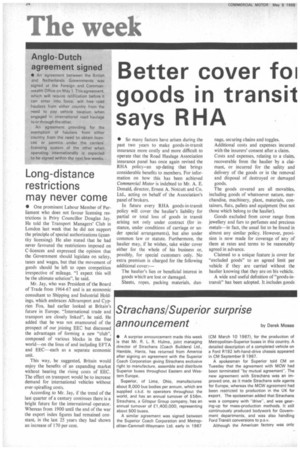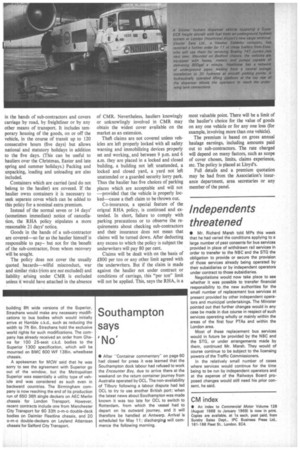Better cover foi oods in transit says RHA
Page 26

Page 27

If you've noticed an error in this article please click here to report it so we can fix it.
• So many factors have arisen during the past two years to make goods-in-transit insurance more costly and more difficult to operate that the Road Haulage Association insurance panel has once again revised the RHA policy—an up-dating that brings considerable benefits to members. For information on how this has been achieved Commercial Motor is indebted to Mr. A. E. Donald, director, Ernest A. Notcutt and Co. Ltd., acting on behalf of the Association's panel of brokers.
In future every RHA goods-in-transit policy will cover the haulier's liability for partial or total loss of goods in transit arising not only under contract (for instance, under conditions of carriage or under special arrangements), but also under common law or statute. Furthermore, the haulier may, if he wishes, take wider cover either for the whole of his business or. possibly, for special customers only. No extra premium is charged for the following additional cover :— T he haulier's lien or beneficial interest in goods which are lost or damaged.
Sheets, ropes, packing materials, dun nage, securing chains and toggles.
Additional costs and expenses incurred with the insurers' consent after a claim. Costs and expenses, relating to a claim. recoverable from the haulier by a claimant, or incurred for the safety and delivery of the goods or in the removal and disposal of destroyed or damaged goods.
The goods covered are all movables, including goods of whatsoever nature, merchandise, machinery, plant, materials, containers, flats, pallets and equipment (but not those which belong to the haulier).
Goods excluded from cover range from jewellery and furs to perfumes and precious metals in fact, the usual list to be found in almost any similar policy. However, provision is now made for coverage of any of them at rates and terms to be reasonably agreed in advance.
Claimed to a unique feature is cover for "excluded goods" to an agreed limit per vehicle if they are carried without the haulier knowing that they are on his vehicle.
A wide and useful definition of "goods-intransit" has been adopted. It ,includes goods in the hands of sub-contractors and covers carriage by road, by freightliner or by any other means of transport. It includes temporary housing of the goods, on or off the vehicle, in the course of transit up to 120 consecutive hours (five days) but allows national and statutory holidays in addition to the five days. (This can be useful to hauliers over the Christmas, Easter and late spring and summer holidays.) Packing and unpacking, loading and unloading are also included.
Containers which are carried (and do not belong to the haulier) are covered, If the haulier owns containers it is necessary to seek separate cover which can be added to this policy for a nominal extra premium.
Instead of the normal seven or 14 days' (sometimes immediate) notice of cancellation, the RHA policy stipulates a more reasonable 21 days' notice.
Goods in the hands of a sub-contractor are covered—so far as the haulier himself is responsible to pay— but not for the benefit of the sub-contractor, from whom recovery will be sought.
The policy does not cover the usually quoted hazards—wilful misconduct, war and similar risks (riots are not excluded) and liability arising under CMR is excluded unless it would have attached in the absence
of CMR. Nevertheless, hauliers knowingly or unknowlingly involved in CMR may obtain the widest cover available on the market as an extension.
Theft claims are not covered unless vehicles are left properly locked with all safety warning and immobilizing devices properly set and working, and between 9 p.m. and 6 a.m. they are placed in a locked and closed building, a building not left unattended, a locked and closed yard, a yard not left unattended or a guarded security lorry park. Thus the haulier has five choices of parking places which are acceptable and will not —provided that the vehicle is properly locked--cause a theft claim to be thrown out.
Co-insurance, a special feature of the orignal RHA policy, is continued and extended. In short, failure to comply with parking precautions or to observe the requirements about checking sub-contractors and their insurance does not mean that claims will be turned down. After deducting any excess to which the policy is subject the underwriters will pay 80 per cent.
Claims will be dealt with on the basis of £800 per ton or any other limit agreed with the underwriters. But if the claim is made against the haulier not under contract or conditions of carriage, this "per ton" limit will not be applied. This, says the RHA, is a most valuable point. There will be a limit of the haulier's choice for the value of goods on any one vehicle or for any one loss (for example, involving more than one vehicle).
The premium is based on gross annual haulage earnings, including amounts paid out to sub-contractors. The rate charged will depend on many factors, such as scope of cover chosen, limits, claims experience, etc. The policy is placed at Lloyd's.
Full details and a premium quotation may be had from the Association's insurance department, area secretaries or any member of the panel.


















































































































